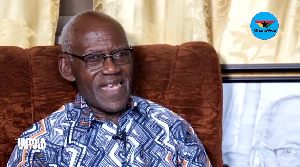- Home - News
- TWI News | TV
- Polls
- Year In Review
- News Archive
- Crime & Punishment
- Politics
- Regional
- Editorial
- Health
- Ghanaians Abroad
- Tabloid
- Africa
- Religion
- Election 2020
- Coronavirus
- News Videos | TV
- Photo Archives
- News Headlines
- Press Release
General News of Thursday, 21 March 2002
Source: Accra Mail
Judges Account for Their Decisions
By 7.30 am yesterday, the Supreme Court had been besieged by a large crowd. Before the case was called, the chamber was filled to capacity and when the nine wise men and women walked in, they faced a packed court room.
As they sat down, it must have dawned on them that they were facing their biggest test since each of them was elevated to the Supreme Court.
The courtroom hushed up immediately the case was called.
It was Mrs. Bamford-Addo who opened the proceedings. She was followed by Justice A.K.D. Ampiah after which Justice Francis Kpegah read his reasons and then Justice E.D.K Adjabeng. These were four of the five who held that the Fast Track Courts are unconstitutional.
At this half way point, Justice George Acquah, one of the four who said the courts are constitutional fell in to read jointly for himself and Chief Justice Wiredu. When he was done Justice William Atuguba gave his reasons and then Justice Sophia Akuffo completed for the four. Mr. Justice I.K. Adzoe, the 5th member of those who ruled in favour of Tsatsu on February 28, read his reasons last.
The courtroom was fairly composed with no overtly political presence, but if the justices had any doubt about the public perception regarding their decision, it was soon to be dispelled. Though the audience refrained from any robust show of approval or disapproval, the controlled murmurings were clearly on the side the 4 justices who said no to Tsatsu Tsikata on February 28, 2002.
In a remarkable twist of irony, the sound system was not at peak performance and people had to strain to hear what the first set of judges, who incidentally were anti Fast Track, were saying. According to an Accra Daily Mail reporter, "the majority not only repeated themselves incessantly, but spoke away from the microphones and used no intonation or expression." By the time it got to Justice Adzoe however, the sound had improved. The proceedings run throughout the day ending at around 5.00pm.
The certified true copies of the reasons would be available in the coming days. The Accra Daily Mail however registered the following insights.
FAST TRACK SUMMARIES
On the reasons why she upheld Tsatsu's claim Ms. Joyce Bamford-Addo said the Fast Track Court (FTHC) is a new court not provided for by the constitution, which therefore makes it an unconstitutional body. She said there was no provision in the constitution that makes it possible for an individual to set up a court different from the existing ones without an Act of Parliament.
"All courts are established by statute on which they depend for their legality."
She queried that if the FTHC is a division of the normal High Court why was it that the rules governing it are different from the normal High Court.
She said in her view, the word "division" has no definite meaning in judicial parlance, but depended on the context in which it is used. Therefore according to her the word used in the Courts Act empowering the Chief Justice to set up divisions of the High Court as and when necessary referred to geographical and territorial locations and not a new court with different rules from the normal High Court.
In addition, she contended that the practice of letting the Chief Justice decide which cases should be brought before the FTHC is unknown to the Courts Act and in that case does not make the court a division of the High Court. In summary she said the FTHC has no legal basis, unconstitutional and not known to the constitution.
According to her the summons which was issued to the plaintiff in the name of the President instead of the Republic is null and void and therefore of no effect.
Justice A.K.B. Ampiah who also sided with the majority said the name "Fast Track" seems to suggest that there are "Slow Track" divisions of the normal High Courts which is not the case. According to him the procedure in which the CJ decides which cases should go before the FTHC meant that not everybody was equal before the law which is contrary to the '92 constitutional provisions.
On the summons, he declared that it was null and void since it contravened Articles 1&2 of the constitution, which vests the administration of justice in the people of the Republic.
Justice Francis Kpegah, also on the majority side considering the nature of the rules of the Fast Track Court said it could not be said to be a division of the normal High Court.
Justice EDK Adjabeng on his part said if the FTHC was a division of the normal High Court it should have been backed by the law and therefore the FTHC is not a division of the High Court but a court on its own.
The last on the majority side to read his decision was Justice T.K. Adzoe who also said the practice where the Chief Justice decides which case should be brought before the FTHC connotes that only the Chief Justice has the keys to justice.
Justice Ampiah's position on the nominal distinction between a court order issued under the name of the president as opposed The Republic came under the scrutiny of Justice Sophia Akuffo. He said because the president had told Tsatsu to appear before court, and not the Republic, the process was null and void.
Justice Sophia Akuffo, addressed the insignificance of this point: "A mere matter of labels and error relating to management procedure rather than constitutionality." Examining the larger picture, she said, "The ultimate objective of the establishment of the Fast Track Court was to create an automated system throughout all courts that was just, speedy, and cost effective. It was an experiment to test electronic management which may have the potential to reduce the enormous backlog that characterizes the Ghanaian judicial system." The elimination of the Fast Track High Court would rather delay, if not prevent this process of modernization. Besides, Justice Akuffo said, "The constitution does not stipulate what kinds of divisions can be made," therefore the Supreme Court must determine only whether the Fast Track High Court is in the "spirit of the constitution." Justice George Acquah who voted on the minority reading for himself and the Chief Justice said the Fast Track High Court is constitutional and contended that it is a division of the normal High Court because Article 136(4) empowers the Chief Justice to create a division of the High Court.
Buttressing his statement he said "At least under the '92 constitution Chief Justice Philip Archer established a number of High Courts not in the regional capitals but in the district capitals... none of these High Courts was established under the constitution by an Act of Parliament or Legislative Instrument..."
He told the court that in the colonial days under the Court Ordinance Act (4) the Chief Justice was requested to publish in the gazette the establishment of any such division of the judiciary, however, he said, "In the 92 Constitution no such requirement of publication in the gazette is imposed on the Chief Justice in Articles 136(4) and 139(3) in the establishment of a division of the High Court."
He said the constitution under Article 157 clause 2 prescribes the method by which the rules of Court Committees should be, but he said Article 139 clause 3 does not prescribe any method by which the Chief Justice may set up a division of the High Court.
He therefore said that the FTHC is a division of the High Court set up by the Chief Justice under Articles 139 of the constitution.
Justice William Atugugah also on the minority said the Fast Track High Court is a division of the normal High Courts set up by the Chief Justice under Article 139 of the constitution.
Justice Sophia Akuffo reiterated that the FTC is a division of the normal High Court but only that it is computerized to expedite cases which is really a laudable idea in this IT age.
The Attorney General, Nana Addo Dankwa Akufo-Addo who was among the large number of legal luminaries in court after the proceedings commented that to read the constitution so strictly as to be obsessed about what exactly constitutes a "division" of a High Court versus a New Court, shows remnants from the archaic British system of colonial law, and could only set Ghana behind in its effort to improve its currently ineffective, inefficient, judicial system. Yaw Asamoah, Executive Secretary of Ghana Integrity Institute, could only identify one redeeming feature in the initial court ruling: "At least the court is looking at itself in depth," but he like many others said he was anxiously awaiting the court to review the case again.










